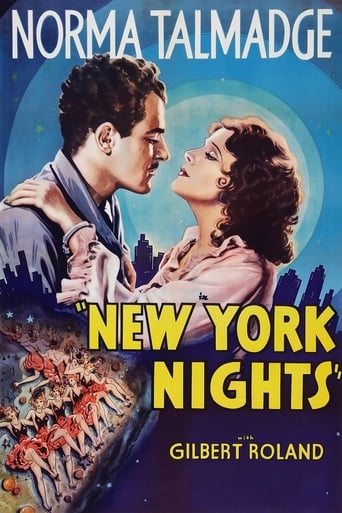boblipton
This is one movie from 1929 that does not deserve the bad reputation it has. Norma Talmadge's voice is fine. Her performance in this remind me of Clara Bow, and director Lewis Milestone throws a costume party for the demi-mondaine that strikes me as something that human beings out for a good time with the rough crowd might go to for: free food and booze -- one at which the neighbors call the cops at 2AM instead of waiting for lightning to set the dirigible on fire a la DeMille.The story is a little flat and predictable for 1929: showgirl Talmadge throws out songwriter-husband Gilbert Roland after he turns up drunk one time too many and takes up with visiting Chicago hood John Wray, who's crazy for her, but she can't help loving the big sap of a hubby.There's lots of good stuff, from proto-noir lighting and some nice moving shots by cameraman Ray June, some fine editing by Hal Kern and good acting all around. So why the lack of interest? I think Miss Talmadge was in her mid-thirties, thought that film-making was getting too complicated, she wasn't getting any younger, and she didn't need the money. She and her sister Constance owned a big chunk of San Diego, anyway.
MartinHafer
Perhaps "New York Nights" worked better when it debuted back in 1929. When seen today, however, the film comes up wanting in many ways-- with some stilted acting and a completely ridiculous ending.When the film begins, Fred (Gilbert Roland) is running around with his buddy getting drunk and chasing when in a speakeasy. Once again, when he returns home he lies to his wife Jill (Norma Talmadge). She believes him at first as well as his recent promise to reform but when an acquaintance reveals the truth, she's had enough.For much of the rest of the film, Jill lives a wild life with wild parties--all in an effort to not think about her now ex-husband. But when she meets him in court after she's been out on a bender and he's a hobo, they reconcile...but what about the gangster that has fallen in love with her? Will he simply allow Fred to come home and step aside for the guy or will it be curtains?This film is only mildly interesting and no more. Not a terrible film but certainly NOT a very good one either.
calvinnme
This was silent drama star Norma Talmadge's talkie debut, and it flopped at the box office. However, for the life of me, I cannot figure out why. Legend has it that Singin in the Rain's Lena Lamont was modeled after Norma, but I have to tell you that I really couldn't detect much of a New York accent in her voice, and her speaking was perfectly fine. She also seemed to understand how to integrate speaking and acting into a cohesive whole. Gilbert Roland was a bit hammy, but if you look at his performances just a couple of years later he improved very rapidly. In fact, the worst performance here - and it's really not that bad - is John Wray as the gangster that is after Norma's character. He plays it way over the top yet he had plenty of roles in talking films for years to come.The story is pretty routine - Jill Deverne (Norma Talmadge)is married to Fred (Gilbert Roland), a struggling songwriter. Their domestic happiness is threatened by a gangster who is interested in Norma and by a chorus girl who is interested in Fred. Lilyan Tashman plays Jill's friend and does a great job with the catty lines as she stands up for Jill.The only thing I can figure about the original failure of this film is that people had a certain idea about their silent stars and, for the most part, giving them a voice just took away the magic and made them seek out new faces - Cagney, Blondell, Tracy, and Hepburn among others. Very few weathered the transition and Norma Talmadge was among the many casualties. If you're a fan of the early talkies I recommend you check this one out if you get the chance. It's a rare opportunity to see Norma Talmadge in a film since so very few of her silent films survive. That's too bad since she was one of the most popular dramatic actresses of the silent era.
drednm
Interesting film based on a Broadway play (TIN PAN ALLEY) that starred Claudette Colbert.The film is famous as one of Norma Talmadge's flop talkie attempts but it's not bad at all and is a better film than her 1930 attempt (and final film) as Madame DuBarry.Talmadge plays a show girl married to a song writer (Gilbert Roland) but everyone is involved in the Broadway night life and endless parties. Plus Talmadge is being pursued by a gangster. Talmadge leaves her husband after he spends the night with a floozie. She ends up as the gangster's moll but soon gets tired of the life.She runs into Roland (on the skids) later and tries to rekindle her relationship but as they attempt to leave wicked NYC for the country they get involved in a botched gangland murder.This film proves that Talmadge had a perfectly good voice (she even sings a little), not overly trained and unnatural as she was as DuBarry. She's also pretty good in a the part and it's fascinating to finally see this great star in a "modern" role. Roland isn't bad as the husband and has surprisingly little accent.Lilyan Tashman is Norma's pal, Roscoe Karns in the music partner, John Wray is the gangster, Mary Doran is the floozie, Jean Harlow has a bit part as a party guest, and Al Jolson makes a cameo and sings a song but it's all cut from the short version of this film that I have.Another curiosity from the transition era. Why would this film have flopped?


